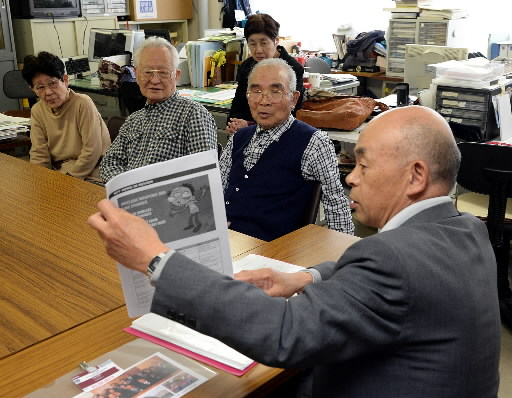Japan’s Non-nuclear Diplomacy Falters, Part 2
May 13, 2013
Policy of Contradiction
by Kohei Okata and Junpei Fujimura, Staff Writers
Emphasizing security over inhumanity of nuclear weapons
Criticizing the Japanese government’s decision not to sign a joint statement on the humanitarian impact of nuclear weapons, Kunihiko Sakuma said, “Nuclear weapons must never be used under any circumstances. The Japanese government knows what would happen if nuclear weapons were used, so they should have given the statement their support.” Mr. Sakuma, 68, is vice chairman of the Hiroshima Prefectural Confederation of A-bomb Sufferers Organizations (Hidankyo), chaired by Kazushi Kaneko.
Mr. Sakuma was sent to Geneva, Switzerland by the Hiroshima prefectural division of the Japan Council against Atomic and Hydrogen Bombs (Gensuikyo) in order to share his A-bomb account at the Second Preparatory Committee for the 2015 Nuclear Non-proliferation Treaty (NPT) Review Conference. At a briefing held on April 30 at Hidankyo’s prefectural office, Mr. Sakuma expressed disappointment at the Japanese government’s stance, saying that his high hopes had been dashed.
Support of 174 nations
A-bomb survivors and the Japanese government both recognize that nuclear weapons are inhumane. Every year, since 1994, Japan has put forward a resolution for nuclear abolition at the United Nations. Last year’s resolution, with its “deep concern about the catastrophic humanitarian consequences of the use of nuclear weapons,” attracted the support of 174 nations. Also, on April 26, Japan’s foreign minister, Fumio Kishida, who was elected from Hiroshima’s first constituency, spoke at the Lower House Foreign Affairs Committee and stressed that Japan, the only country that has suffered nuclear attack, understands the reality of nuclear weapons more keenly than any other nation.
Still, the Japanese government refused to back the joint statement because the document declares that nuclear arms should be not used “under any circumstances.” The government’s decision has made the international community clearly aware of the contradiction Japan maintains, pursuing non-nuclear diplomacy while clinging to the U.S. nuclear umbrella for protection.
The final statement adopted at the 2010 NPT Review Conference referred to the inhumanity of nuclear weapons and the start of negotiations for a nuclear weapons convention. The “inhumanity” of these weapons thus became a rallying cry for A-bomb survivors and the international community in their quest to break the impasse involving nuclear disarmament.
But the Japanese government has taken an unfavorable view toward a nuclear weapons convention. After its success in taking the reins of government, the Democratic Party of Japan advocated the idea of denuclearizing Northeast Asia, but they were unable to produce any concrete progress. One government official commented, “Peace is not realized simply by calling for peace. North Korea’s missiles are a real problem.”
Return to the starting point
Japan is one of the nations leading the Non-proliferation and Disarmament Initiative (NPDI), which is comprised of ten non-nuclear weapon states. The immediate aim of the NPDI is reducing the nuclear risk, not completely eliminating the weapons. The NPDI foreign ministers’ meeting will be held in Hiroshima next spring.
Toshiyuki Mimaki, 71, secretary general of the other faction of the Hiroshima Prefectural Hidankyo, chaired by Sunao Tsuboi, conveyed his A-bomb account at a school in New York when he attended the 2010 Review Conference. Mr. Mimaki still remembers the sympathy the children showed him. He shared his confusion, wondering, “What should survivors say when we are asked if Japan accepts the use of nuclear weapons under certain circumstances?”
Hiroshi Oshima, a professor at Hiroshima Shudo University and a specialist in American studies, commented, “Unless the government changes its security policy, where it simply follows the U.S. lead, the international community won’t trust Japan, no matter how hard it appeals for the abolition of nuclear weapons.” He suggested that Japan return to the starting point, the wish that what happened in Hiroshima and Nagasaki never be repeated. The A-bombed cities must play a role in urging the Japanese government to shift its policy to true non-nuclear diplomacy.
Keywords
The Non-proliferation and Disarmament Initiative (NPDI)
The Non-proliferation and Disarmament Initiative (NPDI) is comprised of ten non-nuclear weapon states: Japan, Australia, Germany, Canada, the Netherlands, Turkey, the United Arab Emirates, Chile, Poland, and Mexico. The NPDI was established in September 2010 to advance the action plan produced at the NPT Review Conference held in May of that year. The NPDI nations seek to make concrete and realistic proposals regarding nuclear disarmament. The foreign ministers of these nations will meet in Hiroshima in April 2014.
(Originally published on May 2, 2013)








